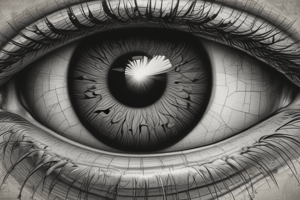Podcast
Questions and Answers
What is the approximate percentage of water in the normal human lens?
What is the approximate percentage of water in the normal human lens?
- 66% (correct)
- 50%
- 75%
- 90%
Which part of the lens is more hydrated than the other?
Which part of the lens is more hydrated than the other?
- Lens nucleus
- Extracellular spaces
- Lens fibers
- Lens cortex (correct)
What is the significance of maintaining water and electrolyte balance in the lens?
What is the significance of maintaining water and electrolyte balance in the lens?
- It is essential for lens growth
- It is necessary for lens protein synthesis
- It is crucial for lens transparency (correct)
- It is important for lens color
What is the characteristic of cortical cataracts in terms of water content?
What is the characteristic of cortical cataracts in terms of water content?
What is the concentration of potassium in the lens?
What is the concentration of potassium in the lens?
Study Notes
Lens Composition
- The normal human lens is composed of approximately 66% water and 33% protein, with little change in this proportion with aging.
Lens Hydration
- The lens cortex is more hydrated than the lens nucleus.
- About 5% of the lens volume is comprised of water found between the lens fibers in the extracellular spaces.
Ion Balance
- Sodium and potassium concentrations within the lens are maintained at 20 millimolar (mM) and 120 mM, respectively.
Lens Physiology
- The mechanism that controls water and electrolyte balance is critical to lens transparency.
- Perturbation of cellular hydration can readily lead to opacification.
Cataracts
- Disruption of water and electrolyte balance is not a feature of nuclear cataracts.
- In cortical cataracts, the water content rises significantly.
Studying That Suits You
Use AI to generate personalized quizzes and flashcards to suit your learning preferences.
Description
Learn about the composition of the human lens, including water and protein proportions, and how cation balance is maintained in the lens.




